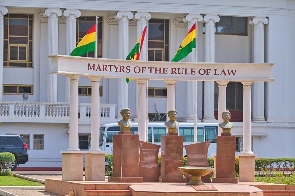Around this time in 2022, there was a lot of talk about the controversial Electronic Transfer Levy (E-Levy) that had been introduced by the Nana Addo Dankwa Akufo-Addo government.
As a way of getting clarification on the matter, some three Members of Parliament (MPs) took a case to the apex court of the land to seek redress.
The ruling of the Supreme Court was an outright throwing out of the case by the three MPs: Haruna Iddrisu, Mahama Ayariga, and Samuel Okudzeto Ablakwa.
Read the full original story as was published by GhanaWeb on Wednesday, May 4, 2022, below:
A seven-member Supreme Court panel on Wednesday, May 4, 2022, denied an injunction application filed by three members of parliament.
The three MPs made of Minority Leader, Haruna Iddrisu, Mahama Ayariga and Samuel Okudzeto Ablakwa, asked the apex court to stop the Ghana Revenue Authority from implementing a 1.5% Electronic Transfer Levy until the determination of a substantive suit against the approval of the act backing the levy by parliament.
This was after the minority MPs in a suit filed on March 30, 2022 asked the court to declare the passage of the E-Levy as unconstitutional and to set aside its approval.
However, when the Supreme Court sat on the injunction application on Wednesday, the bench disagreed with the applicants on their request and denied the injunction.
The court in its ruling relied on section 37 of the Evidence Act to note that Acts of Parliament are presumed to have been regularly performed until determined otherwise by a court.
“We are therefore enjoined by law pending the determination of the substantive matter to presume the regularity of the Act passed by Parliament,” the court is quoted to have stated.
In their statement of case asking for the court to grant an injunction against the E-Levy, the MPs argued that irreparable damage will be caused to the public if the court reneges on granting the injunction.
This the court disagreed with stating that the applicants’ arguments were based on conjecture.
“Applicants submit in Paragraph 19 of their statement of case that irreparable damage will be done. It is not clear how they came to this conclusion and can only concede that it was just a conjuncture,” the Supreme Court indicated.
In their application, the applicants noted that the implantation of the E-Levy would cause hardship to users of electronic payment and money transfer platforms.
However, the court disagreed with the applicants on the matter of hardship.
According to the court, it is rather the state that stands a greater risk of hardship if it goes ahead to grant the injunction.
The court noted that while the GRA could be made to refund the collected levies, the state would not be able to recoup lost revenues if the injunction is granted and the substantive case is lost.
“In our opinion, greater hardship will be on the state and the balance of power tilts in favour of the state.”
The court in line with the decision to reject the injunction application, ordered the GRA to keep accurate records of the levies that will be collected so as to ensure there will not be a disadvantaged party when the substantive matter is determined.
“We order the GRA to keep accurate records of the amounts deducted so that at the end of the substantive matter nobody will he disadvantaged,” the court ruled.
The Supreme Court panel was made up of Justices Nene Amegatcher, Prof. Nii Ashie Kotey, Mariama Owusu, Avril Lovelace Johnson, Gertrude Torkornoo, Henrietta Mensa-Bonsu and Yonny Kulendi
Meanwhile, the Ghana Revenue Authority has since May 1, 2022, commenced the deduction of a 1.5% levy on electronic transfers in line with the E-Levy act.
General News of Thursday, 4 May 2023
Source: www.ghanaweb.com

















